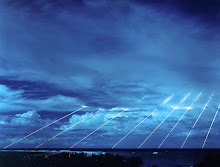If you tell a lie big enough and keep repeating it, people will eventually come to believe it.We are all familiar with this quote. However, the chilling effect of Goebbels influence comes as one reads past the familiar. Goebbels continued:
The lie can be maintained only for such time as the State can shield the people from the political, economic and/or military consequences of the lie. It thus becomes vitally important for the State to use all of its powers to repress dissent, for the truth is the mortal enemy of the lie, and thus by extension, the truth is the greatest enemy of the State. (Unknown primary source document)That is what, I believe, the environmental movement has done with the whole global warming/climate change hysteria they are creating, and sadly, governments, as we see with the IPCC report just released, are colluding under the assumption that carbon dioxide is causing global warming (or as its now been called, climate change, just in case the temperature does go down, it can be blamed on anthropogenic sources as well.)
Looking closely at the IPCC report, we see that they consider it very likely that anthropogenic (human produced) carbon dioxide (CO2) is causing global warming. But there is a footnote to that very likely and looking at that we see it is the definition of "very likely." The report defines "very likely" as ">90% chance of occurance." Now that still leaves 10% chance that it won't occur, which means that there is a 10% chance that the experts are wrong and that their data has been contributed to chance.
What does all this mean? Well, as a student of the political science field, whenever their is a survey, they always quote those numbers at the bottoms of polls saying "+-4%, 95%" What they are saying is that they are 95% certain that the results can be within plus or minus of the number on the screen--the margin of error. So, as you hear the talking heads on TV state that it is a dead heat, that usually means that both candidates or issues are within the margin of error, so, either one could be leading. Well, the IPCC report leaves a 10% chance that they are wrong. Being that political science has to be held to the 95% confidence interval to taken seriously, why then are we basis major economic and policy change on a 90% confidence interval? This question bears acute examination since the hard sciences have always been held to a higher standard. The FDA would not allow a drug on the market that kills 1 person out of every 10 that takes it. They consider that too great a risk. They might allow 1 in 100 and probably 1 in 1000, since the chance of death is 1% and O.1%, respectively.
As Richard Feynman said when the TTAPS report came out about a nuclear war causing nuclear winter: "I really don't think these guys know what they are talking about." I echo the same sentiment towards the global warming scientists. Now, I conceed that Earth is warming, as is Mars and Jupiter. No man-made carbon dioxide there. That science is next.

